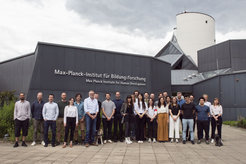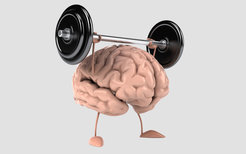Adaptive Rationality
Director: Ralph Hertwig
Introduction
Classic theories of rationality often assume that there is a single best, typically computationally complex, strategy for decision making—and best is best irrespective of the choice environment in which agents find themselves. We at the Center for Adaptive Rationality (ARC) have a different view, inspired by Herbert Simon’s concept of bounded rationality and our and others’ work on ecological rationality. Rather than assuming that there is an ideal and a priori strategy for decision making, we explore the notion of an “adaptive toolbox” of simple strategies that evolved or have been learned in response to environmental demands and the mind’s limited cognitive resources. We highlight the importance of considering the statistical structures of the decision environments and how they can influence the speed, accuracy, or frugality—to name just a few key performance dimensions—of different decision strategies. This notion of ecological rationality implies what is ideally a collaborative relationship between mind and environment: The environment can compensate for the mind’s limited cognitive resources by facilitating the use of simpler decision strategies without sacrificing accuracy. In this view, understanding how cognitive and environmental structures fit together is the key to explaining and predicting human decision making.
We study three classes of cognitive strategies that belong in the adaptive toolbox: heuristics, exploration and learning strategies, and strategies for harnessing the knowledge of others. Across these three classes, we aim to advance three major research goals. The first goal is to describe these cognitive strategies and how they exploit structures of environments. This includes theoretically analyzing and predicting the occurrence of specific structures to understand when and where specific heuristics will work well or falter. The second goal is to unravel the developmental dynamics of the adaptive toolbox over the lifespan. Cognitive tools develop in response to changes inside the mind—for example, cognitive resources such as memory grow or decline—and to changes outside the mind, such as shifting environmental demands. Therefore, it is imperative to understand how the mind’s adaptive toolbox is impacted in response to these internal and external dynamic changes. Our final goal is to help people make better decisions, particularly in modern and highly engineered environments such as social media, which present challenges to individual autonomy and sound decision making. Our objective is to analyze the specific challenges posed by these environments and to design interventions that empower people to counter those challenges and make informed decisions, while preserving agency and autonomy.

Coming from a wide range of disciplines—including cognitive science, psychology, philosophy, economics, biology, anthropology, computational social science, and machine learning—we use a variety of methods, including behavioral experiments, computer simulations, mathematical and theoretical analyses, as well as systematic literature reviews and meta-analyses. In the following, we outline the theoretical tenets and major research areas and turn to some highlights of our work between 2020 and 2022.
The Heuristic Mind

Heuristics are simple cognitive strategies whose success depends on how well they fit the statistical structures of the environment. There is now a growing catalog of environmental structures found to be conducive to the success of heuristics. But this cataloging approach has a weakness, which is that one may end up with a different heuristic for each discernible environmental structure. To predict whether a given heuristic will succeed or fail, researchers need to develop theories of the mechanisms that give rise to structures in the environment. To demonstrate this approach and its benefits, we proposed a new theory that explains the ubiquitous coupling of risks and rewards as arising from competition over limited resources. We also approached the thorny problem of strategy selection and investigated how individuals select a strategy from the adaptive toolbox by exploring how the number of choice attributes influences strategy selection. Finally, we examined how one’s social environment may provide a rich and informative sampling space for making inferences about social statistics. [more]
The Exploring Mind

Considering how people search for and learn from information goes a long way toward explaining their choices. This is well-illustrated by the description–experience gap, that is, the finding that choices vary depending on whether they are based on semantic or symbolic descriptions of stochastic payoff structures versus their direct experience. We have continued to unravel implications of this gap that go far beyond the small world of monetary gambles. For instance, we proposed a framework of the psychology of risk to investigate the influence of learning on people’s responses to risk. We also investigated whether the mainstream but lopsided perspective of people as irrational beings has been shaped by an experimental tradition that emphasized descriptions over experience. We also examined the cognitive attentional mechanisms underlying decisions from experience and continued our investigations into deliberate ignorance, that is, the conscious individual or collective choice not to seek or use available information. [more]
The Collective Mind

People can benefit greatly from social information when making decisions. Yet the social environment can also pose a threat, for instance, when opinions polarize. We have continued to investigate the benefits and challenges of social influence and how it impacts decision making. To this end, we considered the dynamic nature of social networks and their ability to adapt to changing information environments in order to produce intelligent collective behavior. Delving into the dark side of social networks, we developed a model, based on Twitter data, of the emergence of echo chambers and opinion polarization. We also explored the cognitive mechanisms underlying the integration of personal and social information and investigated the possibility that people join groups to divert regret and responsibility away from themselves. Finally, we proposed a new computational theory of conflicts in groups. [more]
The Unfinished Mind

The human mind is a work in progress. We have made significant advancements in understanding the evolutionary origins and the lifelong development of human preferences and the ability to make adaptive judgments and decisions. We conducted pioneering experiments with chimpanzees to examine whether their risk preferences show similarities with human risk preferences, such as an inverted-U-shaped relation between risk taking and age. In other work, we showed how an ecological perspective on adolescent risk taking may help people shift from seeing it as a flaw to seeing it as adaptive. Finally, we untangled a puzzling inconsistency: the finding that whereas adults are often seen as incompetent and even irrational when dealing with probabilities, babies and chimpanzees seem to be surprisingly capable of statistical learning and inference. It turns out that a key factor in understanding this discrepancy is whether judgments are based on abstract descriptions or on the direct experience of probabilities. [more]
The Boosted Mind

We have investigated and promoted the use of boosts—behavioral interventions that aim to foster people’s competences to make good choices while preserving individual agency and autonomy. Boosts differ greatly from nudges, which exploit people’s cognitive biases without correcting them. We continued our conceptual work contrasting boosting and nudging and identified conditions where policy makers may choose to use nudges instead of boosts—even though empowering people to liberate themselves from biased judgments is an uncontroversial social good. We also analyzed the challenges of the online world for democracy and individual autonomy and started developing a tool kit of boosting tools that internet users can use to counter those challenges. Last but not least, we also made contributions to improving risk communication and fighting misinformation in the contexts of COVID-19 vaccination and opioid prescriptions and investigated the use of AI-based models to improve physicians' decision-making competence. [more]





